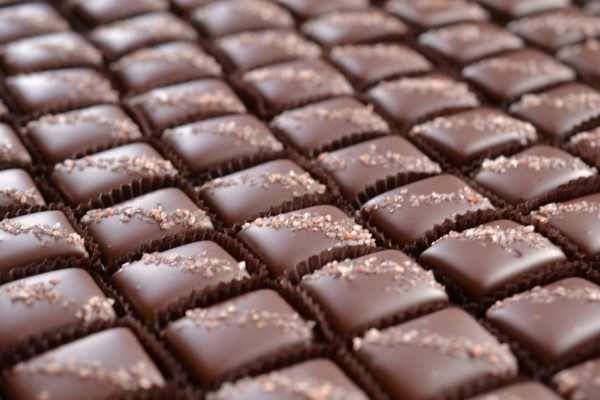 Chocolate?!? Sure, it?s real food, if it?s made the real way. To get the scoop on real, pure chocolate, we headed off for a tour of the Theo Chocolate factory in Seattle. Theo is the first organic and Fair Trade chocolate company in the United States, and only one of 20 factories in the country that makes chocolate ?from scratch? from the whole bean. Theo?s motto is ?Because Chocolate Grows on Trees? ? because, well, it does, or at least the beans do.
Chocolate?!? Sure, it?s real food, if it?s made the real way. To get the scoop on real, pure chocolate, we headed off for a tour of the Theo Chocolate factory in Seattle. Theo is the first organic and Fair Trade chocolate company in the United States, and only one of 20 factories in the country that makes chocolate ?from scratch? from the whole bean. Theo?s motto is ?Because Chocolate Grows on Trees? ? because, well, it does, or at least the beans do.
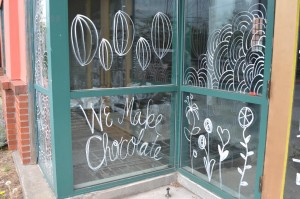
?We Make Chocolate? ? A window outside the Theo Chocolate factory
First, some background: Chocolate is a flavor that?s been?enjoyed for centuries. Although we tend to think of chocolate as a solid today, for 90% of its history it was consumed in liquid form. The ancient Mayan people of Mexico and Central America, for example, consumed it as a spicy drink. It wasn?t until the 16th century that the Spanish, who found cacao while searching for gold in the New World, added sugar to make it a sweet food.
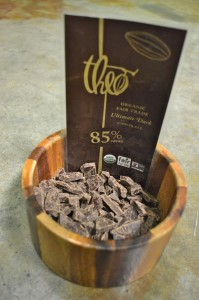
A sampling of dark chocolate with 85 percent cacao
The cacao?seeds that are used?in making chocolate?contain the chemicals caffeine and theobromine (the source of Theo?s name), as well as?significant amounts of naturally occurring flavonoids (substances also found in red wine, green tea, and fruits and vegetables), which are associated with a reduced risk of cardiovascular disease and some cancers. However, most commercially produced chocolate carries a heavy load of saturated fats and calories. If you?re going to eat chocolate, dark chocolate is the way to go. Dark chocolate has fewer calories, less saturated fat, and twice as many antioxidants as milk chocolate.
Fun fact: Chocolate?has to have at least 10 percent cacao?to be called ?chocolate? (Theo?s milk chocolate has 45 percent, and we sampled some dark chocolate that had 85 percent). If you see some chips at the store that seem like they should be called ?chocolate chips? but they are instead labeled ?baking morsels,? you know that they don?t have enough cacao in them to be?considered ?chocolate.?
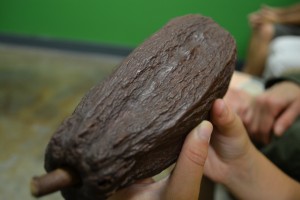
A cacao pod
The road to a delicious bar of Theo chocolate begins at the equator, where cacao trees grow. On these trees grow large pods, about the size of a football, that contain?about 20 to 40 seeds (cacao beans)?inside.?Once harvested, the beans are fermented and dried before they are shipped off to the chocolate factory. To put things in perspective, it?takes two to four pods? worth of beans?to make a single chocolate bar.
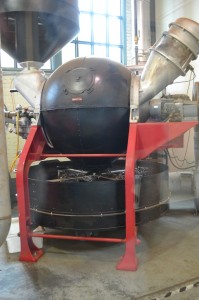
The roaster
When the beans arrive at the Theo factory, they go through several machines: a ?destoner? to clean the exterior of the bean, a roaster to remove humidity from the beans, a ?winnower? to separate the bean husks from the nibs, and then a second roaster to develop the flavor of the nibs.
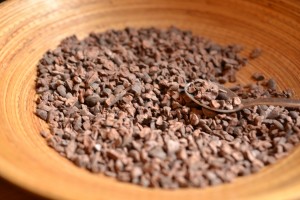
These cacao nibs taste kind of like nuts
If you tried the cacao nibs at this point, they would taste sort of like nuts or coffee beans but with a little more chocolate-y overtones (and in fact, you can buy cacao nibs from Theo). But most of the nibs keep moving through the process: A stone mill (also known as a ?peanut butter machine?) crushes them into paste, and a ?ball mill? reduces the size of the cacao solids in the paste. The paste?that comes out of this process?is what most chocolate factories in the country start with when they make chocolate products.
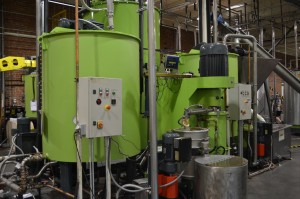
The ?green machine,? a.k.a. the ball mill, which refines the chocolate paste.
From there, the real Willy-Wonka-style magic begins:?A mixer combines the paste with sugar and/or milk powder, and a ?finish refiner? reduces the particle size of the sugar. A special machine called a ?conche? then reduces the acid through circulation and oxidation. The chocolate is next pumped into a holding tank, and then into a ?tempering? machine that forms a bond between the cocoa butter and the cocoa solids. (When a chocolate is tempered correctly, it will have a glossy sheen and it will break with a sharp crack. That?s why,?if you have a chocolate bar that melts in your car and then re-hardens,?you?ve lost the tempering and it will be dull and soft-ish.)?Last, a depositor puts the chocolate into molds and the chocolate travels through a cooling tunnel before it is finally packaged.
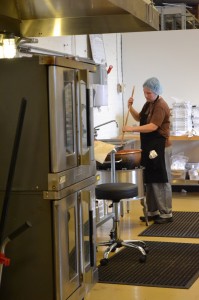
Stirring in the flavorings by hand
How do different specialty confections get made? As our tour guide put it, ?There?s no machine for that, there?s a person who stands there with the ingredients and stirs them in.? And sure enough, once we got into the kitchen, we saw a staffer?hand-stirring a mixture with the flavor of the day.
Environmentally speaking, the company tries to keep everything ?green.? They use sustainable energy to power the factory, as well as?environmentally sensitive?packaging and printing. If you?re a gardener, you can use their cast-off cacao shells for a nice chocolate-scented mulch. And those burlap bags the cacao seeds are shipped in? They?ve been repurposed into some very cool handbags and shopping bags you can buy at the gift store.
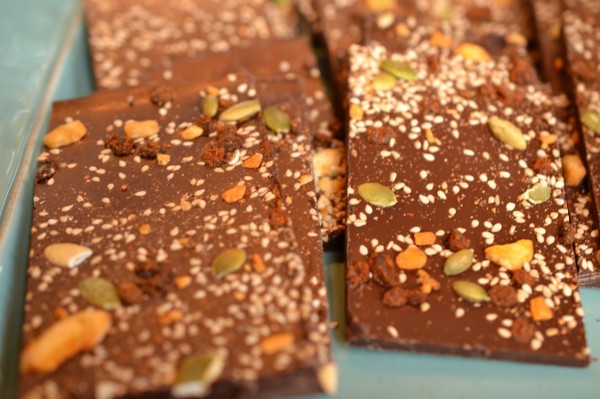
A special summer treat at Theo: Chocolate mole bark, with dried banana, sesame, pepita, current, three types of chile (ancho, pasilla, and guajilla) and sea salt
If you?re hungry for Theo chocolates, you can find them?at a store near you or at Whole Foods markets nationwide. Want?to visit Theo yourself? If you?re in the Seattle area, it?s worth a making the trip. The Theo Chocolate tour lasts about an hour and includes tastings, which you know you want,?because, hey, it?s chocolate.
odd lamar d antoni fashion star andrew bird lizzie borden lizzie borden
No comments:
Post a Comment
Note: Only a member of this blog may post a comment.